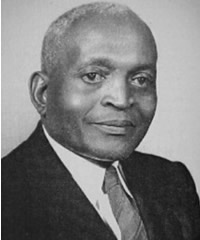The hard labor that characterized the daily routine of slaves, was often relieved by the singing of songs that revealed their inner struggles. Many of these songs, that we also loved and sang, described the bleakness and harshness of their lives, but most of them revealed hope in something better to come.
As we sang, we didn’t realize the significance of such songs as “Carry Me Back to Ole Virginny”, “Old Folks at Home”, and “My Old Kentucky Home” which speak about longings to be reunited with families that slavery had separated. Neither could we feel the pain that inspired such songs as “Uncle Ned”, “Massa’s in the Cold Ground”, and “Ole Black Joe.” According to the words of the song, ‘Ned’ was a good, hard worker who had died and was going to be sorely missed by his ‘Massa’. The sad feelings experienced by slaves at the death of a kind and gentle master are verbalized in the song about Massa in the cold ground, and ‘Joe’ describes how the vigor that he felt in his younger days has turned to sadness because so many of his family and friends have died and he is left all alone. He ‘hears’ them gently calling to him, and his desire is contained in the words, “I’m coming, I’m coming , for my head is bending low; I hear the gentle voices calling, “Old Black Joe.”
Besides the sad, everyday work songs, there were the sometimes mournful, sometimes lively, Negro Spirituals. My favorite was “Swing Low, Sweet Chariot” in which the singers dream of a band of angels and a chariot coming to carry them over ‘Jordan’ where friends who have gone before await them.
A rather peppy, joyful sounding Negro Spiritual is “Oh, Dem Golden Slippers.” Looking forward to wearing golden slippers refers to the happiness and beauty in heaven, but it also speaks of a deprived existence here on earth. I heard more of the hope and joy that the songs exhibited than I heard of the painful situations from which the people were longing to escape.
As children, we did not ‘see’ the inequities of slavery or of the living conditions common to black people after they were set free. We were unaware of the fact that slaves were not allowed to be educated, and that when they were later granted the right to pursue an education, they were not privileged to use the same facilities with white children. Their schools were substandard for many years until segregation was forced upon the white communities in the 1950’s, almost a hundred years after the Civil War! Even our “Christian” colleges had not taken the initiative to right the wrongs done to their fellow human beings. There were no black students at FHC when I was there in the late 40’s; they were not allowed!
It now seems ironic that Christians did not understand what they were doing; it demonstrates what a stronghold common beliefs and attitudes of a community can have upon those who belong to it. The evidences of that influence upon good people was all around me as I was growing up, and for several years I was simply apathetic. That was the way it was, and I felt no need to challenge it.
A little black lady in the Piney Chapel community lived all alone in a remote field on our neighbor’s farm. She evidently had been allowed to remain in the little house where her family had lived as slaves, and she grew old there. She had an apple tree in her yard, and it was rumored that she had given people permission to get some of the apples, but when I accompanied one of my sisters and some neighbor children to take advantage of her offer, she was not so pleased. It was rather frightening to my six-year-old mind when she hobbled with the aid of a cane out of her house, yelling as she came. Her anger, however, was due to the fact that we had picked apples off the tree rather than having gotten the fallen ones from the ground!
The prejudicial attitudes that existed in Alabama in those days had resulted in all-white rural communities, and the few black people who were allowed to live in a city, huddled together in its most impoverished sections. It was in just such an area in Athens, that my grandfather’s hired man, Will, lived.
Will came early every morning, worked all day and walked home each evening after his work was done. While everyone else ate lunch in the dining room, Will always ate sitting on the edge of the porch or in the kitchen depending on the weather.
Many lines of demarcation had been established, so when another black man came occasionally to pick cotton, it must have been unacceptable for me to admire him, but admire him I did. He sometimes sang as he worked and his voice seemed to me to be right out of heaven! I don’t even remember his name, but I remember having asked him more than once to sing as we worked side by side at the same kind of job under the same hot Alabama sun, now made more bearable by the music pouring forth from this poor man’s soul. My recognition of something great in this lowly being may have been the beginning of the end of whatever prejudice I had acquired from my community.
As we seriously look at what happened in the minds and hearts of many honest, God-fearing people during the troublesome times of slavery, we must continue to examine ourselves for similar delusions that rob us of our abilities to know right from wrong.



